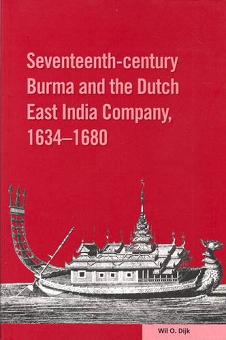
Seventeenth-century Burma and the Dutch East India Company 1634-1680
Wil O. Dijk
348 pages including index
published in 2006
I got this book out of the library soley on the strength of the author’s own story. Wil O. Dijk was born in Kobe, Japan in 1934, the daughter of a Dutch businessman and a Montenegrin-Burmese (!) mother. As a child she lived in Japan and Burma, with her brother got sent to Singapore when war broke out in 1941, became a prisoner of the Japanese there, like so many other children, while her mother fled to India and her father joined the British 14th army. They all survived war and after being reunited with their parents she and her brother spent some years at boarding school in Holland, before they returned east to Karachi when the Korean War broke out. There she stayed, met her husband, a Dutch foreign service employee, travelled with him from posting to posting all over the world, raising three daughters in the process, then came to stay in Holland permanently in the 1980ties. Wanting to reconnect with her Asian roots, she enrolled as a mature student at Leiden first to study Japanology, then to specialise in Burmese history, the end result of which is this book, written when she was well in her seventies!
Even without the author’s lifestory I would’ve gotten this book though. The focus in Dutch colonial history has understandably always been with Indonesia as well as with the colonies in the Americas, Surinam and the Dutch West Indies, as these were the most enduring, important and longest lived Dutch colonial ventures. With some exceptions (Nieuw Amsterdam obviously, South Africa), the rest of Dutch colonial history is mainly a concern for specialists. Which as Wil O. Dijk makes clear in her introduction, goes double for Dutch involvement with Burma, largely neglected even by specialists, yet no less important and interesting for it.